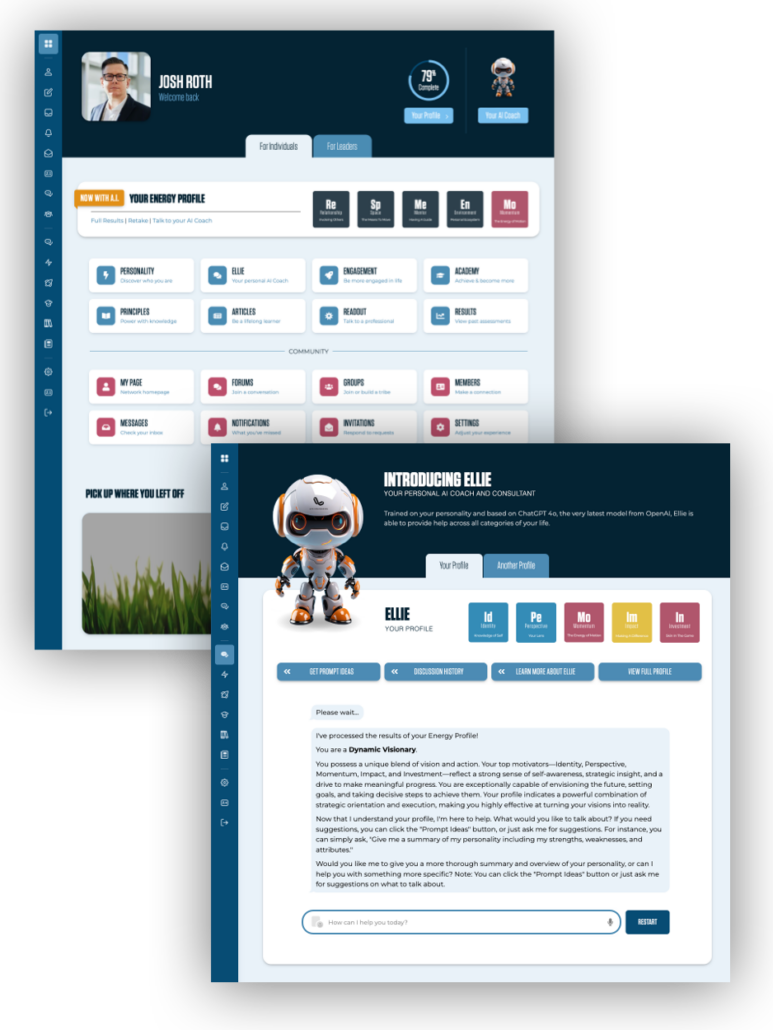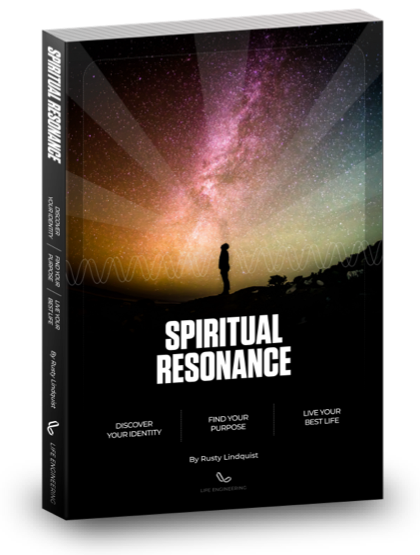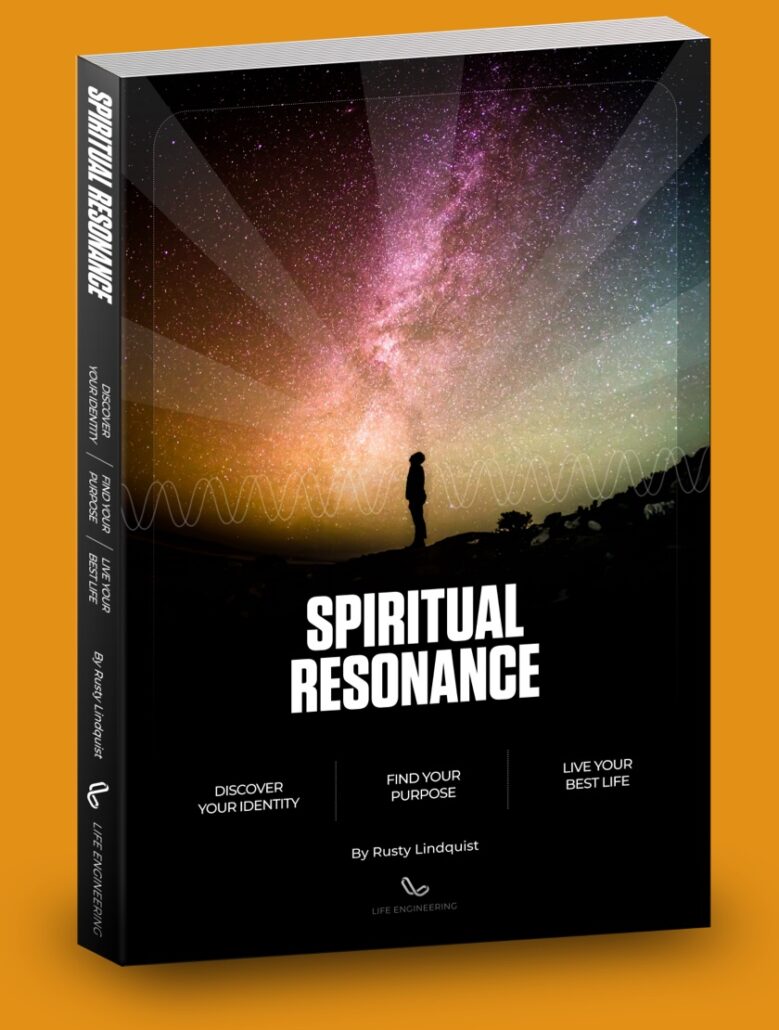Foundations
The Energy Iceberg - Part 1
Understanding the Role of Energy in Personal Progress
academy
When it comes to achievement, there are only three variables… time, talent and energy. We focus on time and talent… but energy matters most.
Learn about the interplay of these three, and how optimizing for energy will be the main driver of your success.
Lesson 1
INTRODUCTION
course objectives
- Describe where you are stuck
- Describe how well time and talent are currently working for you
- Explain the dynamics of time, talent, and energy
- Recognize the importance of optimizing for energy (why should you care?)
- Practice using some of the 16 Elements of Life Engineering to “solve for energy”
- Define what “optimized for energy” looks like to you and how you will measure your success
- Assess your level of confidence in your ability to optimize for energy
- Assess your commitment and predict the likelihood that you will take steps to optimize your energy
Optimize for Energy
When it comes to achieving our goals and moving forward in life, there are really only three variables… there’s time, talent and energy. We tend to focus almost exclusively on time and talent.
But to truly drive performance, we need to learn how to optimize for energy, because that is what turbocharges the use of our time and our talent.
Lesson 2
What it Feels Like to Be Stuck
Waiting to Be Saved
There are simply times in our life where we will get stuck. Getting stuck can be painful, and can sometimes even feel like our very lives are on the line.
But through the relentless application of desire and will, we have the capacity to get unstuck, to escape whatever circumstance we are in, and to achieve the outcomes we desire.
The Power of a “Want”
We need to be very mindful of our wants, because they are the most powerful drivers of human behavior. This can work against us; and it can work for us.
They are what give us the strength and the energy to move forward. They give us the fuel to move forward so we can finally and ultimately get unstuck and on our way.
reflection activity
Identify Something Out of Reach
Consider a goal in your life, either personal or professional, that continually seems to be out of reach. What’s keeping you stuck in your pursuit of your goal?
Explore that question in the activity below.
Activity: Identify Something Out of Reach
Lesson 3
Assess Why You’re Stuck
Losing Energy
Getting stuck is simply part of life. We don’t need to be too hard on ourselves when we find that we are stuck. What really matters is that we figure out why we’re stuck and get to work getting unstuck.
To do that, we need to dig DEEP, looking at our desire, our engagement, our enthusiasm, and our passion toward the thing we want to accomplish… because when those are gone, we won’t have the fuel to move beyond where we are.
reflection activity
Assess Why You’re Stuck
Getting stuck sometimes happens across all the categories of our lives. We just feel stuck in everything. Other times, we can be moving forward just fine in one area of our life (or critical context), but we feel stuck in another. If you’re feeling stuck in one or more contexts of your life, take a moment, open your journal, and write down the answers to these simple assessment questions.
Activity: Assess Why You’re Stuck
Lesson 4
Resolve to Get Unstuck
Quicksand
Sometimes getting out of difficult situations, or getting unstuck, requires help from others. Sometimes it even takes a team.
There’s an African proverb that says “If you want to go fast, go alone; but if you want to go far, go together.”
reflection activity
Assess Who Can Help
One of the most important aspects of getting unstuck is knowing who you can turn to for help. Relationship, one of the 16 Elements, falls in the Assemble Pillar of the Human Achievement Process along with Mentor. These two elements are a critical component of assembling what we need to keep moving forward in our life. So consider the following as you think about an area of your life where you feel stuck.
Activity: Assess Who Can Help
Lesson 5
Time Management Hasn’t Gotten Results
Limits to Time Management
We often try too hard to do too much in the too-little time we have. We cram and fill out time. It’s like we think that time is the only lever we have if what we want is to move forward.
But the over-optimization of time has diminishing returns. To really maximize our time and increase our outcomes, we need to begin to focus a little less on time, and a little more on energy.
reflection activity
Balancing Time, Talent, and Energy
It’s helpful to occasionally assess where you fall on this spectrum of balance between time, talent, and energy.
Take a moment and answer the questions in the following activity about yourself and how you pursue your objectives. Try to be honest and think deeply. That introspection will pay off.
Activity: Balancing Time, Talent, and Energy
Lesson 6
Increasing Talent Hasn’t Gotten Results
The Limits to Talent
Talent is an essential ingredient in productivity. Many have the desire to gain more knowledge and develop new skills. The challenge is changing this desire to grow our talents into an action.
As Michael Nicholson was putting the final touches on his thesis paper for his graduate degree in criminal justice, it didn’t bother him that none of the professors reviewing his paper sided with his assessment of the shooter on the grassy knoll in the Kennedy assassination.
He explained, “I made a convincing case, a case they couldn’t disagree with.” His paper was accepted, and Nicholson graduated.
Nicholson was a good student. He’d always been a good student. And not only had he always been a good student, he had always been a student… as in he had spent fifty-five years in college earning thirty degrees, including twenty-three masters degrees, three specialist degrees, and one doctorate.
For him, college was more than just a stepping stone to a job, he said, “That’s the purpose of college, after all—to get a job, of course, but also to broaden your horizons, expand your view of the world.”
Learning is important to us, no matter if our goal is to earn thirty degrees, earn thirty billion dollars, or serve one person in poverty.
Regardless of whether we learn best in school, on our own, through books, through conferences, in the school of hard knocks, online, through observation, or through asking questions, learning is important. Lifelong learning is important.
To have impact, we need to know stuff. Most CEOs intuitively understand this. According to executive coach Jim Kwik, “Most CEOs read a book a week.”
But to really make an impact, we need to not just learn stuff, we need to DO stuff. This takes engagement and energy to apply the knowledge we’ve gained and the talents we’ve acquired. When our energy for work is high, the talent we’ve developed leads to performance and progress and achievement.
But for many of us, our talents and knowledge lies latent without the upward force of energy to compel us into action.
We certainly need to develop and leverage talents. But we also need the accompanying power of energy to get the value from the talent and knowledge we’ve gained.
reflection activity
Finding the Energy to Learn
Consider something that you’d like to make more progress on than you currently are.
Ask yourself the questions in the activity below and see what they might tell you about how to activate the energy you need in order for you to achieve the outcomes you desire.
Activity: Finding the Energy to Learn
Lesson 7
Conclusion
Below the Waterline
The best way to think about the interplay between our time, talent, and energy is to think of an iceberg. Time and Talent are what lie above the waterline of our personal attention. They manifest themselves as behavior (what we do with our time and our talent). But it’s what lies below the waterline of our attention that matters most, and that’s energy.
When our energy for our activities and objectives is high, it drives up the impact of time and talent. But when that energy fades, so too does the impact of our time and talent. Understanding this interplay, and learning to balance the conflict that can occur with energy, is critical to maintaining motivation to achieve what matters most.
We care deeply about helping you live your best life.
So much so, that I want to give you a free copy of my most recent book, Spiritual Resonance, to help you fully discover yourself and live authentically.
We’ve also created an assessment to help you discover your Identity, and have trained AI to understand and talk to you about your specific results!




Responses